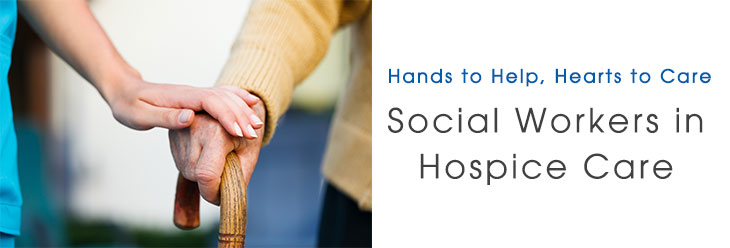Every day the nation’s 650,000 social workers serve as advocates, champions, and leaders to make our society a better place to live. Social workers can be found in practically every realm of public service, from hospitals and schools to government and social service agencies.
Hospice Social Workers can help navigate the difficult end of life journey patients and families experience; emotionally, physically and spiritually. Hospice Social Workers offer guidance through the many practical and emotional issues that arise. Here are a few ways Hospice Social Workers support patients and families during end-of-life care.
Listen and Evaluate
Social workers listen to patients and families dealing with a terminal diagnosis. They evaluate the situation the patients are in from a problem-solving perspective. Understanding each patient and family’s unique situation allows them to create a tailored plan to best benefit the patient and family.
Educate
Often, families who have not experienced death may not know what to expect with a declining loved one. Hospice Social Workers will walk the family through the decisions which need to be made along with the healthcare team. They can skillfully translate medical jargon and help provide insight to the patient and family.
Advocate
Hospice Social Workers advocate for the needs, wishes, and rights of the patient throughout the extent of care. Like a protective shadow, the hospice social worker defends the patient’s interests. And the caring does not stop after the patient has passed. The Hospice Social Worker has intimately experienced the dying process with the family. They will continue to offer relief for the emotions and grief the family will be experiencing.
Coordinate
Hospice Social Workers not only make sure all treatments follow the wishes of the patient and family but also provide a wealth of knowledge. They coordinate advance care planning and provide assistance with funeral planning and legal documents. Hospice Social Workers can also help relieve financial stresses that come with end-of-life care. They have knowledge of financial resources and can provide guidance. Social workers can help navigate insurance coverages, medical costs and can help connect the patient to community resources.
Preparing for death is not an easy task, but social workers strive to help patients and loved ones through the process. If you or your loved one is nearing the end of life and believe you could use the support of hospice care, contact Assisted Home Health & Hospice at www.AssistedCares.com or 800-949-6555.








